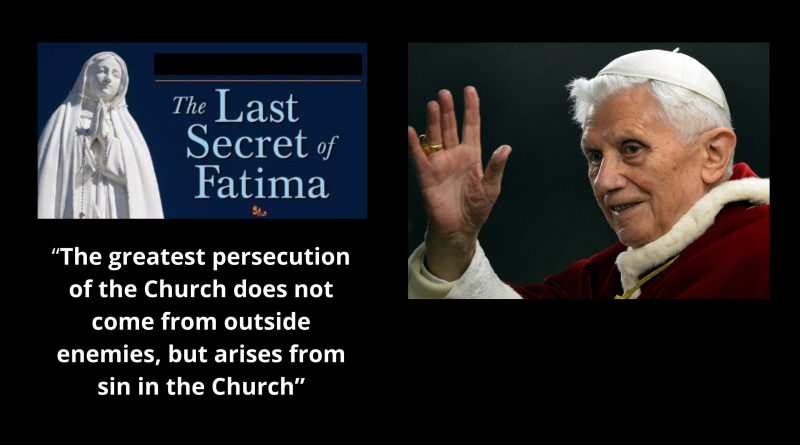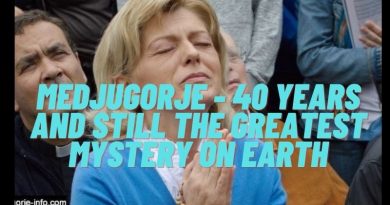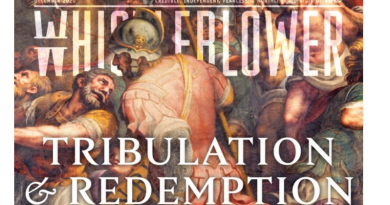The third secret of Fatima: “A persecution will come from “inside the Church.” Pope Emeritus Benedict XVI Warns…
“The greatest persecution of the Church does not come from outside enemies, but arises from sin in the Church” . From Fatima, the most famous Marian event in the history, became famous for “secrets” of the shepherds. From Fatima where Pope Benedict XVI was carrying out a short but very intense journey, he launched a stearn warning.
In flight to Lisbon, Benedict XVI responded to the question of a journalist who asked whether it is possible to include in the “vision” of the persecuted Church – contained in the third part of the “secret” of Fatima – also “the sufferings of today’s Church with sins” sexual abuse of minors “. And he did it this way: “As for the news that we can discover today in this message, it is also that not only from outside attacks the Pope and the Church, but the sufferings of the Church come from within, from the sin that exists in the Church.
We see this too, but today we see it in a truly terrifying way: that the greatest persecution of the Church does not come from outside enemies, but arises from sin in the Church. And that the Church therefore has a profound need to re-learn penance, accept purification, learn forgiveness but also the necessity of justice. Forgiveness does not replace justice. We must learn precisely this essential: conversion, prayer, penance, theological virtues and that evil also attacks from within, but that also the forces of good are always present and that finally the Lord is stronger than evil and the Our guarantee is for us. The goodness of God is always the last answer in history “.
To welcome the Pope arrived in Lisbon, was the president of Portugal Anibal Cavaco Silva. The homily celebrated in the large Terreiro do Paco square in Lisbon was attended by 200 thousand people. “We often worry about the social, cultural and political consequences of faith, taking for granted that this faith exists, ” declared Benedict XVI. – And this, unfortunately, is less and less realistic ». As in every age, the Pope adds, even today’s Church “there are no shortage of riotous and even rebellious children”.According to Joseph Ratzinger, “it is in the saints that the Church recognizes her own characteristic traits and, in them, she savor her deepest joy. They all share the desire to incarnate the Gospel in their lives, under the impulse of the eternal animator of the People of God which is the Holy Spirit “. The pontiff then urged Portugal to bring “the contribution of its cultural and religious identity” also “by participating in the building of the European Union”. The socialist government legalized abortion in 2007, the divorce in 2008, and now Parliament has approved a bill on gay marriage. The Lusitanian country, officially 88% Catholic, prepared to visit the Pope in joy. Placards and posters with a photo of the Pope over the inscription “Bem-Vindo or Papa Bento XVI”, “Welcome Pope Benedict XVI”. Three Portuguese TV stations, one public and two private, began broadcasting live on the visit two hours before the Pope’s arrival.
Prophecies always have more than one meaning. The third part of the secret, Benedict XVI repeats now, is a “great vision of the suffering of the Pope, which we can in the first instance refer to Pope John Paul II” (Benedict XVI 2010). But this “first instance”, interpretative, if it retains all its importance, does not exclude others. On the contrary, in secret, the Pope affirms, “the realities of the future of the Church are indicated as they develop and show themselves. So it is true that beyond the moment indicated in the vision, we speak, we see the need for a passion of the Church, which is naturally reflected in the person of the Pope, but the Pope stands for the Church and therefore are the sufferings of the Church announcing » . The central image of the third part of the secret is the figure of all the persecutions that the Popes and the Church in history continually suffer. Even the betrayal of pedophile priests and the related media persecutions against the Pope are part of the “firearms and arrows” of the secret, which always “soldiers” in the service of anti-Christian ideological projects are ready to launch against the Pope. « As for the news that we can now discover in this message – confirms Benedict XVI alluding to the issue of pedophilia, which in the trip to Portugal has never explicitly mentioned – there is also the fact that not only from outside attacks the Pope and the Church, but the sufferings of the Church come from within the Church, from the sin that exists in the Church. This too has always been known, but today we see it in a truly terrifying way: that the greatest persecution of the Church does not come from outside enemies, but arises from sin in the Church […] “ (ibid.). More generally, “one would delude those who thought that the prophetic mission of Fatima is over” (Benedict XVI 2010), and in this sense one can say that it is wrong to refer the third part of the secret only to the attack on John Paul II. In 1917, Our Lady announced a “passion of the Church” (Benedict XVI 2010) that will manifest itself “in different ways, until the end of the world” (ibid.). It is certainly the passion of John Paul II struck by the attack of 1981. But one can think that it is also the passion of Paul VI (1963-1978), struck and embittered by the unprecedented attacks of postconciliar theological dissent after the publication of the Encyclical Humanae vitae of 1968. It is the passion of Benedict XVI, wounded both by the crimes of pedophile priests and by the slander of those who manipulate the tragic cases of pedophilia to attack the Pope directly.
It will be the passion of a future Pope in fifty or one hundred years, because being calumniated and persecuted is part of the nature and history of the Church, not only according to the prophecy of Fatima but according to the prophetic word of the same Lord Jesus: “If they persecuted me, they will also persecute you “ (Jn 15, 18).
Modern history: “a cycle of death and terror”. “Man has been able to unleash a cycle of death and terror, but he can not interrupt it …” (Benedict XVI 2010). At the heart of the Fatima message there is a judgment on history, and in particular on modern history. The tragedies announced at Fatima did not end with the end of the twentieth century ideologies and communism, to which the 1917 message refers. The crisis is not resolved. From a certain point of view it is today more serious than ever, because it is first of all a crisis of faith, therefore a moral and social crisis . “Faith in large parts of the earth risks extinguishing itself like a flame that is no longer fed […]” . “Many of our brothers live as if there was not an afterlife, without worrying about their eternal salvation” . Of course, God continues to go in search of the heart of every man, even in our time as in every age.«But who has time to listen to his word and be fascinated by his love? Who is watching, in the night of doubt and uncertainty, with a heart awake in prayer? Who is waiting for the dawn of the new day, keeping the flame of faith burning? “ Within the Church itself there is no lack of infidelity, misunderstandings, absence of healthy realism. “Often – added the Pope – we worry frantically about the social, cultural and political consequences of the faith, taking for granted that this faith exists, that which unfortunately is less and less realistic. Perhaps excessive confidence was placed in ecclesial structures and programs, in the distribution of powers and functions; but what will happen if salt becomes tasteless? “ (Benedict XVI 2010).
In the clergy itself, one can not fail to mention “a certain weakening of priestly ideals or the fact of dedicating oneself to activities that do not entirely agree with what is proper to a minister of Jesus Christ” .
.
«Someone could say: ” the Church needs great currents, movements and testimonies of holiness … but there are not! “» .Even if the Pope responds to this “someone” (ibid.) Recalling the consoling and positive presence of movements and other ecclesial realities, some of which have the message of Fatima at the center of their action, the presence of a certain fatalism, ” the temptation to limit ourselves to what we still have, or we think we have, of our own and of certainty: it would be a dying to term, as a presence of the Church in the world” . The crisis of faith is accompanied by a moral crisis. We all risk succumbing to the “pressure exerted by the dominant culture, which presents with insistence a style of life based on the law of the strongest, on easy and attractive gain” . The initiatives that aim to protect the essential and primary values of life, from its conception, and of the family, founded on the indissoluble marriage between a man and a woman, help to respond to some of the most insidious and dangerous challenges that today arise. to the common good. Nor, facing these issues in Fatima, the Pontiff thought to move away from the message of 1917: on the contrary, “all this is well integrated with the message of Our Lady that resounds in this place […]”, where Mary speaks to us of a crisis that it has an essential component in the public offenses to the moral law.The crisis of faith and morality is part of a more general crisis of our society, de-Christianized, fragmented, at the mercy of ever new flows of images that prevent reflection and true communion among people. The visionaries of Fatima have taught us that in order to truly receive the messages of the Lord and Our Lady “an inner vigilance of the heart is required which, for most of the time, we do not have because of the strong pressure of external realities and images and concerns. that fill the soul “ . In the meeting in Fatima with the bishops of Portugal, responding to Monsignor Jorge Ortiga, archbishop of Braga and president of the Portuguese Episcopal Conference who in his speech had evoked the category of “liquid modernity” of the British sociologist of Polish origin Zygmunt Bauman, Benedict XVI he recalled “those human environments where the silence of faith is broader and deeper: the politicians, the intellectuals, the professionals of communication who profess and promote a monocultural proposal, with disdain for the religious and contemplative dimension of life” . But also in this regard – as he often did on the pilgrimage to Fatima, and in harmony with the interpretation he proposed of the message of Our Lady – the Pope stressed that the crisis is not only external, but also internal to the Church : “There is no lack of believers who are ashamed and who give a hand to secularism, a builder of barriers to Christian inspiration” . Neither are adequate pastoral programs and “solutions that respond to the logic of efficiency, visible effect and publicity” , or that hide the Christian proclamation in the name of a generic humanitarianism. On the contrary, in the Church a “firm identity of institutions” is needed (ibid.). “Keep alive the prophetic dimension, without gags, in the scenario of the current world, because” the word of God is not chained! “(2Tim 2, 9)» . edited by
by Stefano Santi





